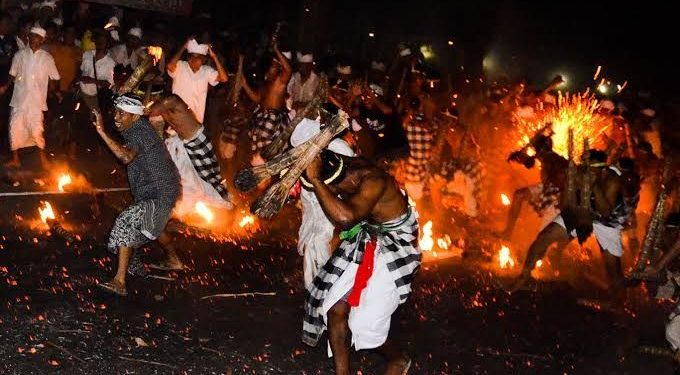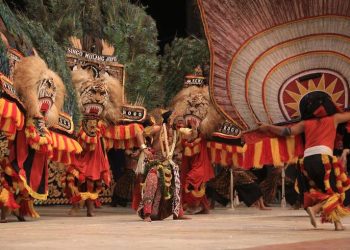Jakarta, Indonesia Sentinel — Indonesia is home to a rich tapestry of traditions, among them the Fire War, or Ter-Teran, in Bali. This centuries-old practice has been passed down through generations, became a vibrant symbol of Bali’s spiritual and social heritage
The tradition began as a sacred ritual aimed at protecting communities from misfortune and driving away evil spirits. Today, it has evolved into a cultural emblem deeply rooted in both spiritual and social values.
The Ter-Teran reflects the Balinese belief in harmony between humans, nature, and the spiritual world. During the event, two groups of villagers face off, hurling flaming coconut husk balls at one another in a controlled contest of courage.
Though it appears dangerous, the ritual follows strict customary rules to ensure safety. The fireballs are not weapons of harm but spiritual symbols meant to ward off danger and cleanse the community.
Beyond its dramatic visuals, the fire war serves as a celebration of solidarity. The competition fosters stronger bonds between villages, turning what might seem like a battle into a shared cultural expression. For locals, the annual gathering is not only a spiritual ritual but also a joyful reunion, a chance to honor ancestors, strengthen community ties, and keep a centuries-old tradition alive.
Read Also:
Indonesia to Host Chandi Summit 2025 in Bali, Strengthen Global Cultural Diplomacy
Study suggests that Bali fire war tradition could serve as an effective hands-on history lesson for high school students. By integrating local cultural traditions into education, researchers say, students can connect with history in a more tangible way, beyond the pages of a textbook. The approach is also aimed at fostering national pride and encouraging the preservation of ancestral heritage.
In Pakraman Jasri village, the fiery ritual is more than a cultural spectacle. It is a community ceremony that honors deep-rooted customs and spiritual beliefs, reminding residents of the balance between humans, nature, and unseen forces believed to guard the harmony of life.
The event also serves as a bridge between generations. Young villagers are not only introduced to the values and wisdom of their ancestors but are actively involved in keeping the tradition alive.
With its spiritual meaning, social value, and role in cultural education, the fire war tradition remains a cornerstone of Bali’s heritage. For the community, it is far more than a dramatic nighttime performance, it is a unifying ritual that reinforces identity and safeguards a legacy meant to endure for generations.
(Raidi/Agung)
























